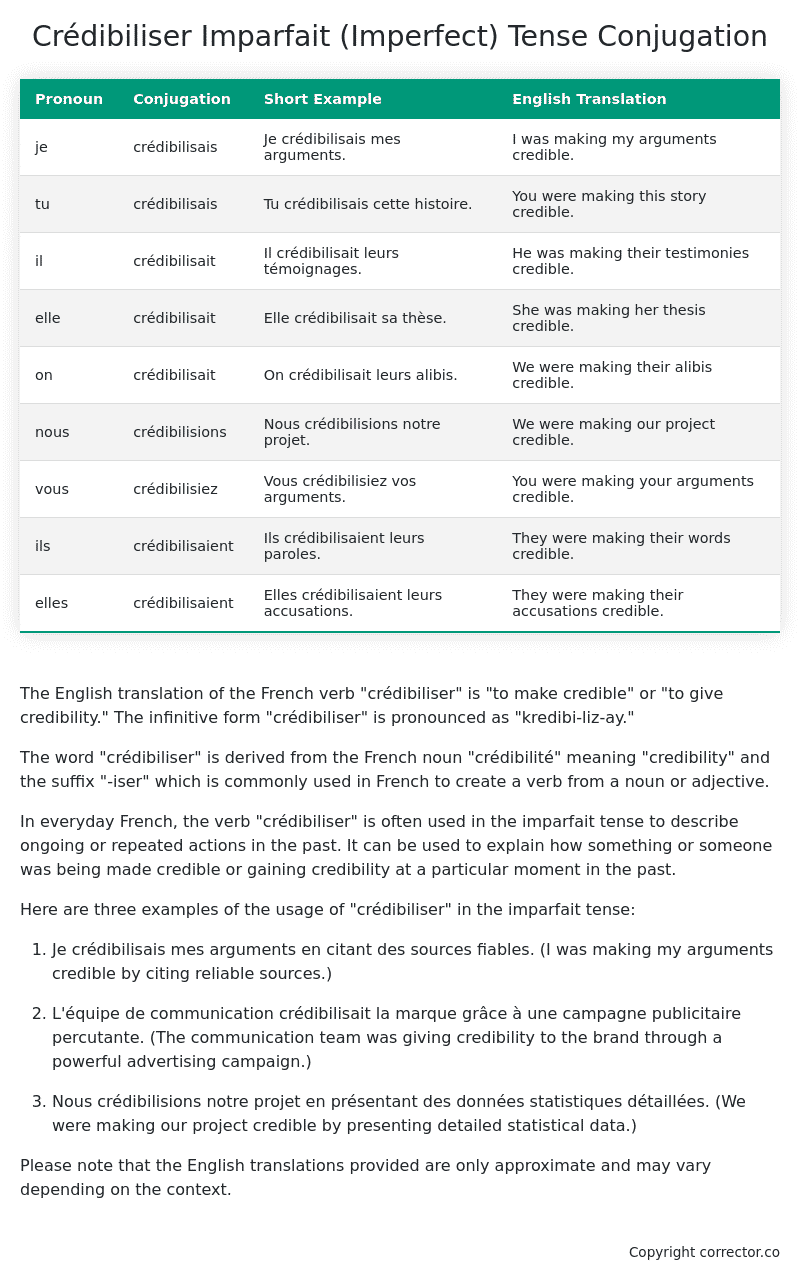Imparfait (Imperfect) Tense Conjugation of the French Verb crédibiliser
Introduction to the verb crédibiliser
The English translation of the French verb “crédibiliser” is “to make credible” or “to give credibility.” The infinitive form “crédibiliser” is pronounced as “kredibi-liz-ay.”
The word “crédibiliser” is derived from the French noun “crédibilité” meaning “credibility” and the suffix “-iser” which is commonly used in French to create a verb from a noun or adjective.
In everyday French, the verb “crédibiliser” is often used in the imparfait tense to describe ongoing or repeated actions in the past. It can be used to explain how something or someone was being made credible or gaining credibility at a particular moment in the past.
Here are three examples of the usage of “crédibiliser” in the imparfait tense:
-
Je crédibilisais mes arguments en citant des sources fiables.
(I was making my arguments credible by citing reliable sources.) -
L’équipe de communication crédibilisait la marque grâce à une campagne publicitaire percutante.
(The communication team was giving credibility to the brand through a powerful advertising campaign.) -
Nous crédibilisions notre projet en présentant des données statistiques détaillées.
(We were making our project credible by presenting detailed statistical data.)
Please note that the English translations provided are only approximate and may vary depending on the context.
Table of the Imparfait (Imperfect) Tense Conjugation of crédibiliser
| Pronoun | Conjugation | Short Example | English Translation |
|---|---|---|---|
| je | crédibilisais | Je crédibilisais mes arguments. | I was making my arguments credible. |
| tu | crédibilisais | Tu crédibilisais cette histoire. | You were making this story credible. |
| il | crédibilisait | Il crédibilisait leurs témoignages. | He was making their testimonies credible. |
| elle | crédibilisait | Elle crédibilisait sa thèse. | She was making her thesis credible. |
| on | crédibilisait | On crédibilisait leurs alibis. | We were making their alibis credible. |
| nous | crédibilisions | Nous crédibilisions notre projet. | We were making our project credible. |
| vous | crédibilisiez | Vous crédibilisiez vos arguments. | You were making your arguments credible. |
| ils | crédibilisaient | Ils crédibilisaient leurs paroles. | They were making their words credible. |
| elles | crédibilisaient | Elles crédibilisaient leurs accusations. | They were making their accusations credible. |
Other Conjugations for Crédibiliser.
Le Present (Present Tense) Conjugation of the French Verb crédibiliser
Imparfait (Imperfect) Tense Conjugation of the French Verb crédibiliser (You’re reading it right now!)
Passé Simple (Simple Past) Tense Conjugation of the French Verb crédibiliser
Passé Composé (Present Perfect) Tense Conjugation of the French Verb crédibiliser
Futur Simple (Simple Future) Tense Conjugation of the French Verb crédibiliser
Futur Proche (Near Future) Tense Conjugation of the French Verb crédibiliser
Plus-que-parfait (Pluperfect) Tense Conjugation of the French Verb crédibiliser
Passé Antérieur (Past Anterior) Tense Conjugation of the French Verb crédibiliser
Futur Antérieur (Future Anterior) Tense Conjugation of the French Verb crédibiliser
Subjonctif Présent (Subjunctive Present) Tense Conjugation of the French Verb crédibiliser
Subjonctif Passé (Subjunctive Past) Tense Conjugation of the French Verb crédibiliser
Subjonctif Imparfait (Subjunctive Imperfect) Tense Conjugation of the French Verb crédibiliser
Conditionnel Présent (Conditional Present) Tense Conjugation of the French Verb crédibiliser
Conditionnel Passé (Conditional Past) Tense Conjugation of the French Verb crédibiliser
Conditionnel Passé II (Conditional Past II) Tense Conjugation of the French Verb crédibiliser
L’impératif Présent (Imperative Present) Tense Conjugation of the French Verb crédibiliser
L’impératif Passé (Imperative Past) Tense Conjugation of the French Verb crédibiliser
L’infinitif Présent (Infinitive Present) Tense Conjugation of the French Verb crédibiliser
L’infinitif Passé (Infinitive Past) Tense Conjugation of the French Verb crédibiliser
Le Participe Présent (Present Participle) Tense Conjugation of the French Verb crédibiliser
Le Participe Passé (Past Participle) Tense Conjugation of the French Verb crédibiliser
Struggling with French verbs or the language in general? Why not use our free French Grammar Checker – no registration required!
Get a FREE Download Study Sheet of this Conjugation 🔥
Simply right click the image below, click “save image” and get your free reference for the crédibiliser imparfait tense conjugation!

Crédibiliser – About the French Imparfait Tense
NOTE: To take a deep dive into all the French tenses then see our article on Mastering French Tense Conjugation.
Formation of the Imparfait Tense
For regular -er verbs:
For regular -ir verbs
For regular -re verbs
Common Everyday Usage Patterns
Description of Past Habits
Background Information
Mental and Emotional States
It’s employed to express emotions, thoughts, or physical sensations in the past. For example: “J’étais content quand il est arrivé.” (I was happy when he arrived.)
Ongoing Actions
Points to Note About the Imparfait Tense
Passé Composé vs. Imparfait
Conditional
Si Clauses
Narration
I hope you enjoyed this article on the verb crédibiliser. Still in a learning mood? Check out another TOTALLY random French verb imparfait conjugation!


